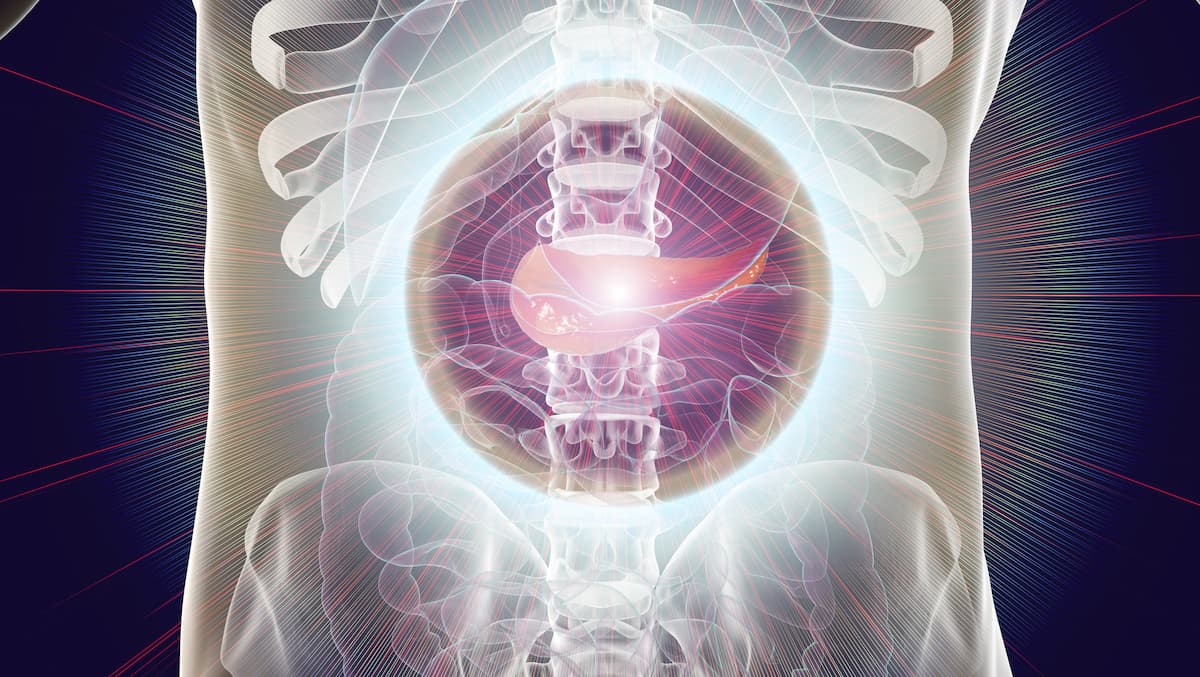Metabolic-Bariatric Surgery Reduces Pancreatic Cancer Risk in Obese Group
Regardless of type 2 diabetes status, pancreatic cancer risk was reduced with metabolic-bariatric surgery for patients who were obese.
“[MBS] not only has beneficial effects on obesity and type 2 diabetes but also may play a crucial role in reducing the risk of pancreatic cancer in these individuals,” according to study ,author Angeliki M. Angelidi, PhD.

Patients who were obese and received metabolic-bariatric surgery (MBS) had a reduced risk of pancreatic cancer regardless of having type 2 diabetes, according to findings from a systematic review published in Diabetes/Metabolism Research and Reviews.1
The risk ratio (RR) was lower in the MBS group vs the control group for those with type 2 diabetes (RR = 0.21; 95% CI, 0.07-0.57) and for those without type 2 diabetes who underwent MBS (RR = 0.56; 95% CI, 0.41-0.78). In the MBS group, the pancreatic cancer incidence rate was 0.08% vs 0.15% in the control group. When all studies were assessed, the RR for the overall population was 0.46 (95% CI, 0.30-0.71).
“[MBS] not only has beneficial effects on obesity and type 2 diabetes but also may play a crucial role in reducing the risk of pancreatic cancer in these individuals,” corresponding author Angeliki M. Angelidi, PhD, of the Broad Institute of MIT and Harvard, said in a press release.2 “These findings underscore the need for further research to elucidate the underlying mechanisms and understand the full spectrum of health benefits of MBS beyond weight loss.”
Of the 1765 potentially eligible studies, 12 were considered appropriate for this review. There was a total of 3,711,243 individuals between the ages of 18 and 79 who enrolled on these 12 studies. The follow-up period ranged from 22 months to 33 years.
For those in the control arm who did not receive MBS, 3,054,481 were enrolled vs 656,762 who did receive MBS. Most patients were female. Of note, 4 studies identified pancreatic cancer incidence in those with type 2 diabetes for those who underwent MBS.
The effect of MBS on pancreatic cancer was assessed in patients with and without type 2 diabetes, and there was a favorable trend of MBS for those with diabetes vs those without. However, there was no significant association (RR = 0.51; 95% CI, 0.15-1.71).
“Interestingly, our study shows that individuals with obesity and [type 2 diabetes] may benefit more from MBS than those without [type 2 diabetes]. In our subgroup analysis based on the presence or absence of [type 2 diabetes], we found that MBS was associated with a 44% reduction in pancreatic cancer risk among individuals with obesity but without [type 2 diabetes], whereas a 79% risk reduction was observed in [individuals] with both obesity and [type 2 diabetes],” the study authors wrote.1
“Therefore, to investigate whether individuals with obesity and [type 2 diabetes] may benefit further from MBS, we performed an additional analysis in the MBS group between [individuals] with [type 2 diabetes] and non-[type 2 diabetes]. Although we found no statistically significant association between the presence of [type 2 diabetes] and pancreatic risk reduction, a favorable trend was observed in the [individuals] with [type 2 diabetes].”
The subgroup analyses were divided by continent and MBS type. Six studies in America, 1 in Asia, and 3 in Europe were included. There was a significantly lower risk of pancreatic cancer in America (RR = 0.70; 95% CI, 0.57-0.87) and Europe (RR = 0.27; 95% CI, 0.17-0.43) after MBS. The heterogeneity in the American and Asian studies was 0%.
A total of 3 studies had patients who underwent sleeve gastrectomy (SG), and 5 studies had patients undergoing Roux-En-Y Gastric Bypass (RYGB). For those in the SG group, the incidence of pancreatic cancer was 0.06% vs 0.31% in the control group. Based on MBS types, there was a significant difference between the SG group (RR = 0.24; 95% CI, 0.12-0.46) and the RYGB group vs the control group (RR = 0.52; 95% CI, 0.25-1.09). Additionally, there were no significant differences between the 2 types of MBS procedures (RR = 1.32; 95% CI, 0.92-1.89).
Regarding publication bias, Egger’s test showed none for those with (P = .261) and without (P = .917) type 2 diabetes.
“Our study has clinical implications, as our findings suggest that MBS may reduce [pancreatic cancer] risk in obese populations with or without [type 2 diabetes]. The role of ΜBS represents a promising intervention that may benefit this high-risk population by reducing the risk of developing obesity-related malignancies,” the authors concluded.1
References
- Angelidi AM, Martinou EG, Karamanis DG. Metabolic-bariatric surgery reduces pancreatic cancer risk: a meta-analysis of over 3.7 million adults, independent of type 2 diabetes Status. Diabetes Metab Res Rev. 2024;40(7):e3844. doi:10.1002/dmrr.3844
- Can weight-loss surgery help prevent pancreatic cancer in people with obesity? News release. Wiley. October 9, 2024. Accessed October 10, 2024. https://shorturl.at/O2WBd
Newsletter
Stay up to date on recent advances in the multidisciplinary approach to cancer.